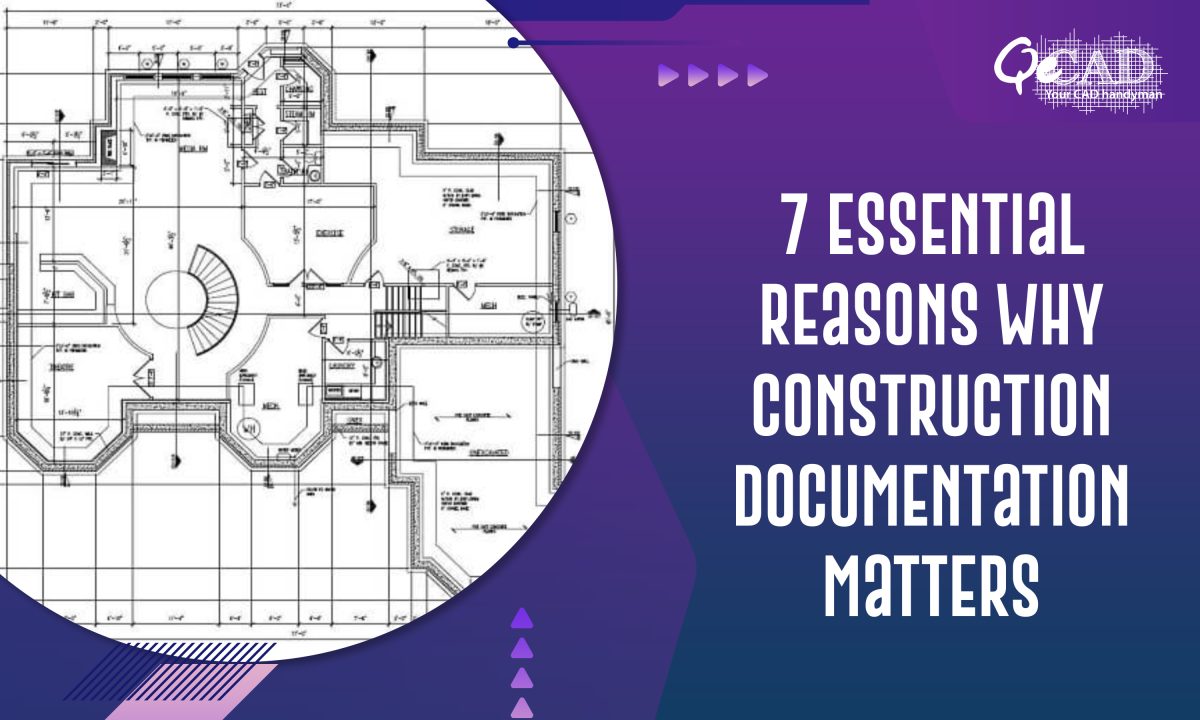
02 Oct 2024
By : dolly / Comments 0
7 Essential Reasons Why Construction Documentation Matters
In the construction complexity, every detail matters. Construction projects engage a diverse range of stakeholders, including architects, engineers, contractors and clients. All of them work together to turn a vision into reality. However, this intricate process can easily become chaotic without a well-defined framework. Enter construction documentation—a comprehensive collection of all drawings, specifications, contracts and records that guides a project from conception to completion.
While many might view construction documentation as a tedious administrative task, however, it is crucial for the success of any construction project. It provides a roadmap that keeps all the parties aligned, sets clear expectations as well as safeguards against the potential pitfalls. In this industry where miscommunication and errors can lead to costly delays as well as legal disputes, having robust Construction Documentation Services are essential.
Construction documentation encompasses a range of digital assets that are required at the time of planning, approvals, as well as the execution. In this blog post, we’ll explore seven compelling reasons why comprehensive construction documentation is not just a necessity but a strategic advantage for anyone involved in the construction process. Whether you are an owner, a contractor or an architect, understanding the value of thorough documentation can help you navigate through the challenges and enhance the overall success of your projects.
1. Clear Communication
Construction documentation serves as a universal language for all the stakeholders involved in a project. A well-structured set of documents ensures that all parties are aligned on design intent, project requirements, and timelines. This clarity reduces the risk of misunderstandings and conflicts thereby helping to avoid costly delays as well as changes during the construction process.
2. Legal Protection
In the event of disputes, comprehensive construction documentation acts as a protective measure. Contracts, change orders along with specifications act as legal proof of the agreed-upon terms and conditions. Proper documentation can help protect all parties involved with clear proof of obligations and expectations. This is essential in avoiding potential lawsuits and claims for breach of contract.
3. Budget Management
Accurate documentation is essential for effective budget management. Detailed plans, specifications and cost estimates allow project managers to track expenses, compare projected costs with actual expenditures as well as make necessary adjustments. When any changes occurs, a well-maintained documentation helps in ensuring that the budget revisions are accurately reflected and communicated thereby minimizing the financial surprises.
4. Quality Control
Construction documentation plays a vital role in quality control. The detailed specifications outlines the materials, methods along with the standards required for the construction. By referring to these documents, contractors and workers can ensure that the construction meets the desired quality as well as the safety standards. This not only strengthens the project’s overall integrity but also decreases the chances of rework or defects ultimately saving both time and money. This can be accurately done with the help of accurate Drafting Services.
5. Project Tracking and Accountability
Construction documentation is also essential for tracking the progress of the project and ensuring the accountability. With clearly defined milestones as well as the documented deliverables, the project managers can monitor the status of the tasks and identify any delays or issues that may arise. This accountability fosters a culture/sense of responsibility among team members thereby ensuring that everyone is working towards the same goals.
6. Asset Management
Construction documentation is crucial for the effective asset management. By maintaining accurate records of materials, equipment along with facilities, the project managers can efficiently track and manage resources throughout the construction lifecycle. This not only helps in the allocation and utilization of assets but also provides valuable data for the future projects.
7. Data Encryption and Privacy
In an era of increasing digitalization, the security of construction documentation is paramount. Utilizing the data encryption helps protect sensitive project information from unauthorized access thereby ensuring that confidential details remain secure.
Moreover, robust privacy practices make sures the compliance with the regulations as well as foster trust among the clients. This protection of data not only safeguards the interests of the parties involved but also helps to maintain a competitive edge in a data-driven industry.
Conclusion
Investing in thorough construction documentation is not merely a bureaucratic necessity; it is a fundamental practice that can significantly impact the success of any project. Right from enhancing communication to legal protection to even facilitating budget as well as asset management, the benefits of comprehensive documentation are clear.
By prioritizing construction documentation, you can ensure that your projects run smoothly and meets all the expectations.
If you are an AEC professional, remember that a good documentation is the foundation of any successful construction endeavour.

